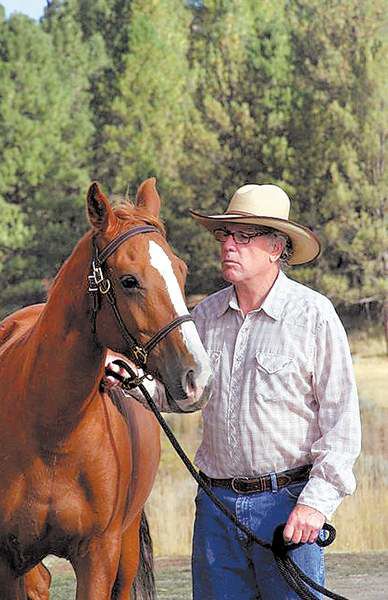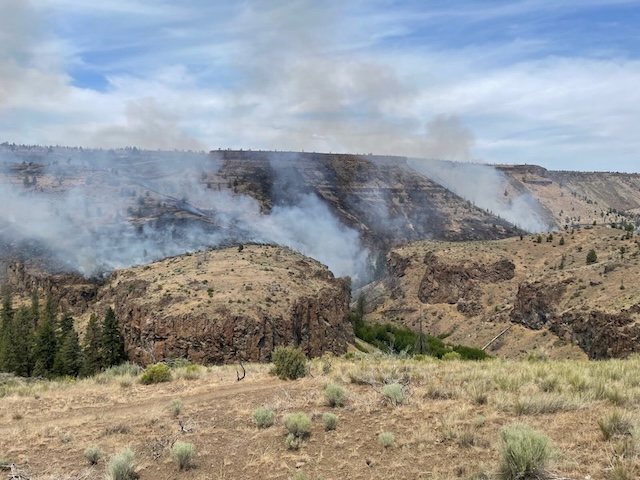Horse auction
Published 5:00 am Tuesday, October 19, 2010

- Neil Browne tends to Suzzy in this undated photo. He adopted from Equine Outreach, where he has been volunteering for three years, and is in the process of adopting a second.
One-hundred horses in need of safe homes will be put up for auction Saturday at Equine Outreach, a nonprofit horse rescue located off Butler Market Road near Bend Municipal Airport.
The auction action actually begins sooner, with a daylong viewing beginning at 8 a.m. Friday (see “If you go”).
Of the 150 animals now living at the 20-acre ranch, 70 were purchased in June at a wild horse auction in Warm Springs.
“They were slated to sell them off, and whoever the highest bidder was got them,” explains Brian Waldron, manager at the ranch. “Could’ve been a meat buyer, or rodeo stock contractors. Could have been anybody. We didn’t want to take that risk, so we took them in to find them good homes.”
The mission of the facility, which was started by Bend real estate broker Joan Steelhammer, is “to facilitate the rescue, rehabilitation and permanent placement of abused, neglected and unwanted horses and mules.”
Horses at Equine Outreach run the gamut from registered, high-dollar quarter horses to thoroughbreds, burros and mules. They range in age from a few weeks old to age 37.
“Anything that’s equine-related,” Waldron says. “We have all makes and models.”
One crafty mule, named Pistol, can open gates on the premises and let itself and horses out, so chains are kept on pasture gates.
“When you put a halter on a horse to (lead) it out, sometimes the mule will get the rope and walk away with your horse,” says Neil Browne, a volunteer at the facility.
Equine Outreach, whose motto is “rescue, rehabilitate, rehome,” usually adopts out its animals. However, adoption is a slower process, says Waldron, a 34-year-old former wild horse specialist for the Bureau of Land Management who began working at the ranch three months ago.
In total, the horses eat about three tons per day at the volunteer-run nonprofit, “not to mention all the special feeds and grain that go into the older horses,” Waldron says. “This is probably a $500-a-day operation … just to maintain.”
That cost does not factor in additional bills such as utilities, farriers or veterinarian care, he says. The wild horse purchase in June put Equine Outreach under additional strain, he says: “We took a huge risk, and now we need the public’s help.”
If all the horses to be auctioned off were to sell, Equine Outreach would be back to operating at a more normal capacity, good news for its older, blind or crippled horses, permanent residents at the ranch.
“We’re one of the last few rescues out there; most of them have gone under,” says Waldron.
Equine Outreach has a list of about 200 volunteers, but about 30 are core volunteers who spend much of their free time at Equine Outreach. Browne, an Oregon State University-Cascades Campus associate professor of English, is one of them.
He began volunteering at Equine Outreach after visiting three years ago with a group of former students. Now, he’s there as often as he can be, which is almost daily in the summer. He’s adopted one horse, Suzzy.
He’s in the process of adopting a second, a large brown thoroughbred named Durango.
The horse was “cowboyed” roughly by its previous owner, explains Browne, and it bears scars from barbed-wire fences.
“Neither one of these horses did I set out to adopt,” he says. “I didn’t start working with them with the idea of adopting. It just sort of happened.”
Suzzy was the first animal that he’d trained, albeit with considerable help. “She was a very, very difficult animal. She was very aggressive, or seemed to me, anyway. Seemed mean, anyway; still is at times.
“The process of watching her change, and just seeing what some kindness and care can do, was pretty moving for me, and pretty much the same thing with him,” he says, referring to Durango, who has a mellower disposition than Suzzy.
“You just grow attached to them more and more, the more you work with them,” he adds. “I mean, they’re fun to ride, obviously … (but) I didn’t come out here to volunteer so I could ride horses.”
Adds Waldron, “We’re not a boarding facility or a riding facility.”
“You just grow accustomed to being with them,” Browne says. “In the long run, I just hope, like most people who take them in, to give him a better life than he had.”
If you go
What: Rescued horse auction at Equine Outreach
When: Daylong viewing begins Friday at 8 a.m.; auction at 10 a.m. Saturday
Where: Equine Outreach, 63220 Silvis Road, Bend
Cost: Free
Contact: 541-419-4842 or www.equineoutreach.com






